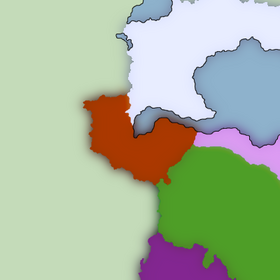Gwaxol
Jump to navigation
Jump to search
| Gwaxol | |
|---|---|
| gwaxol⁵ | |
| File:??? ??? | |
| Pronunciation | [gʷɑ˩xo˥ɮ̊] |
| Created by | Dillon Hartwig |
| Date | 2022 |
| Setting | Pollasena |
| Native to | ??? |
Wasc
| |
| Official status | |
Official language in | ??? |
Range Map of Gwaxol (brown), alongside Kelajw (white), 'Oa (pink), and Thuosha' (purple) | |
Gwaxol /gwəˈhoʊl/ (Gwaxol: gwaxol⁵ [gʷɑ˩xo˥ɮ̊]) is a mixed Wasc-Nentammmi language spoken south of the central Merizon Mountains.
Etymology
Gwaxol⁵, the language's autonym, is inherited from the Wascotl's autonym *wasc-otl.
Orthography
Gwaxol is written with ???. Its romanization is as follows.
| A a | Ä ä | D d | E e | Ë ë | G g | Gw gw | Ğ ğ |
|---|---|---|---|---|---|---|---|
| /ɑ/ | /ɛ/ | /d/ | /e/ | /ə/ | /g/ | /gʷ/ | /ɣ/ |
| H h | I i | Ï ï | K k | Kw kw | L l | Ł ł | M m |
| /h/ | /i/ | /ɨ/ | /k/ | /kʷ/ | /ɮ/ | /ɬ/ | /m/ |
| N n | Ng ng | Nw nw | Nz nz | O o | Ö ö | R r | S s |
| /n/ | /ŋ/ | /ŋʷ/ | /z̃/ | /o/ | /ɵ/ | /r/ | /s/ |
| T t | Th th | U u | Ü ü | W w | X x | Xw xw | Y y |
| /s/ | /θ/ | /u/ | /ʉ/ | /ɣʷ/ | /x/ | /xʷ/ | /ʝ/ |
| Z z | ¹ | ² | ³ | ⁴ | ⁵ | ⁶ | |
| /z/ | /˥-˥/ | /˩-˩/ | /˥-˧/ | /˧-˩/ | /˩-˥/ | /˥-˩-˧/ |
- Hyphens disambiguate /Cʷ, θ, ŋ, z̃/ ⟨Cw, th, ng, nz⟩ from /Cw, th, ng, nz/ ⟨C'w, t'h, n'g, n'z⟩
- Tone numbers are written word-finally
Phonology
Consonants
| Labial | Dental | Alveolar | Palatal | Velar | Labialized velar | Glottal | ||||
|---|---|---|---|---|---|---|---|---|---|---|
| Nasal stop | m | n | ŋ | ŋʷ | ||||||
| Nasal fricative | z̃ | |||||||||
| Stop | t | d | k | g | kʷ | gʷ | ||||
| Fricative | θ | s | z | ʝ | x | ɣ | xʷ | ɣʷ | h | |
| Trill | r | |||||||||
- /ŋ, z̃, θ/ only occur in loanwords.
- All consonants assimilate in voicing to following consonants and all voiced consonants devoice word-finally, but this voicing change does not change fortition; for example /ɮ/ devoices to [ɮ̊] rather than [ɬ], and /ɬ/ voices to [ɬ̬] rather than [ɮ].
Vowels
| Front | Central | Back | ||
|---|---|---|---|---|
| High | i | ɨ | ʉ | u |
| Close-mid | e | ɵ | o | |
| Mid | ə | |||
| Open-mid | ɛ | |||
| Low | ɑ | |||
- /ɛ/ only occurs in loanwords.
Tones
Gwaxol has six word tones.
| High | Low | High falling | Low falling | Rising | Dipping |
|---|---|---|---|---|---|
| ˥-˥ | ˩-˩ | ˥-˧ | ˧-˩ | ˩-˥ | ˥-˩-˧ |
- /˩-˩, ˧-˩/ only occur in loanwords.
Tones are realized with pitch shifting throughout the word from the first tone to the second; in words with dipping tone, pitch is lowest at the end of the penultimate syllable and rises in the final syllable.
| High | Low | High falling | Low falling | Rising | Dipping | |
|---|---|---|---|---|---|---|
| Monosyllable | ën¹ "it is it" /ən˥˥/ [ə˥n̥] |
gey² "it counts it" /geʝ˩˩/ [ge˩ʝ̊] |
zis³ "it gives it" /zis˥˧/ [zi˥˧s] |
dëy⁴ "it laughs at it" /dəʝ˧˩/ [də˧˩ʝ̊] |
hëgw⁵ "it finds it" /həgʷ˩˥/ [hə˩˥g̊ʷ] |
thöt⁶ "it savors it" /θɵt˥˩˧/ [θɵ˥˩˧t] |
| Disyllable | sekën¹ "I am it" /sekən˥˥/ [se˥kə˥n̥] |
sekgey² "I count it" /sekgeʝ˩˩/ [se˩k̬ge˩ʝ̊] |
sekzis³ "I give it" /sekzis˥˧/ [se˥k̬zi˧s] |
sekdëy⁴ "I laugh at it" /sekdəʝ˧˩/ [se˧k̬də˩ʝ̊] |
sekhëgw⁵ "I find it" /sekhəgʷ˩˥/ [se˩khə˥g̊ʷ] |
sekthöt⁶ "I savor it" /sekθɵt˥˩˧/ [se˥˩kθɵ˧t] |
| Trisyllable | sekëni¹ "I was it" /sekəni˥˥/ [se˥kə˥ni˥] |
sekgeyi² "I counted it" /sekgeʝi˩˩/ [se˩k̬ge˩ʝi˩] |
sekzisi³ "I gave it" /sekzisi˥˧/ [se˥k̬zi˦si˧] |
sekdëyi⁴ "I laughed at it" /sekdəʝi˧˩/ [se˧k̬də˨ʝi˩] |
sekhëgwi⁵ "I found it" /sekhəgʷi˩˥/ [se˩khə˧gʷi˥] |
sekthöti⁶ "I savored it" /sekθɵti˥˩˧/ [se˥kθɵ˩ti˧] |
| Quadrisyllable | sekënilen¹ "I was not it" /sekənilen˥˥/ [se˥kə˥ni˥le˥n̥] |
sekgeyilen² "I did not count it" /sekgeʝilen˩˩/ [se˩k̬ge˩ʝi˩le˩n̥] |
sekzisilen³ "I did not give it" /sekzisilen˥˧/ [se˥k̬zi˦si˦le˧n̥] |
sekdëyilen⁴ "I did not laugh at it" /sekdəʝilen˧˩/ [se˧k̬də˨ʝi˨le˩n̥] |
sekhëgwilen⁵ "I did not find it" /sekhəgʷilen˩˥/ [se˩khə˨gʷi˦le˥n̥] |
sekthötilen⁶ "I did not savor it" /sekθɵtilen˥˩˧/ [se˥kθɵ˧ti˩le˧n̥] |
Atonal words bear the last tone in the preceding word and word-initially have no set pitch.
